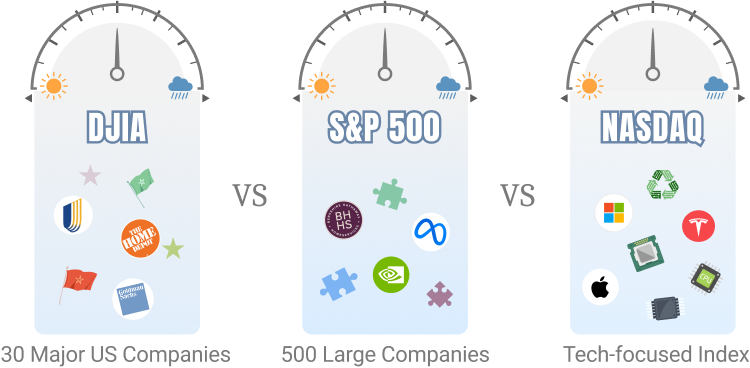A stock index plays a crucial role in the world of investing, providing a clear, concise snapshot of how a particular section of the stock market is performing. To understand its importance, think of it like this.
Definition of a Stock Index
Imagine you're watching a soccer match with many players on the field. Each player is doing something different, but if you want to know how well the entire team is doing, you don't focus on one player. Instead, you look at the overall score.
A stock index works like that score. It tells you how a group of companies, or the “team,” is performing overall. Instead of looking at individual companies, the index gives you an average of how all the companies in that group are doing. This helps investors see whether the market is going up or down.

Why Do Stock Indices Matter?
The stock market is like changing weather—sometimes sunny (bull market), sometimes stormy (bear market). A stock index acts as your market barometer, helping you predict these shifts. When the index rises, it signals a thriving market; when it falls, it warns of potential downturns.
The stock index helps you to quickly assess the overall market conditions and craft more precise investment strategies. Additionally, indices provide the foundation for index funds and Exchange-Traded Funds (ETFs). These funds track the performance of an index, offering investors a low-risk, diversified investment approach. Without picking individual stocks, investors can easily participate in the market’s ups and downs and enjoy a wide range of investment opportunities.
Key Stock Indices You Should Know About
1.The Dow Jones Industrial Average (DJIA) is like the All-Star Team of the U.S. economy. It's made up of 30 of the biggest and most powerful companies, representing industries like technology, healthcare, and finance. When you hear about the DJIA going up or down, it's like checking the score of a major game—it shows how these economic giants are doing. The DJIA is one of the most famous stock indices in the world, and many investors watch it closely.
2.The S&P 500 Index is like a snapshot of the whole U.S. market. Covering 500 of the largest U.S. companies, this index gives you a broad view of how the American economy is doing. Think of it as the big picture, not just focusing on a few big players but a wide range of industries as well as companies. If you want to know how the market as a whole is moving, the S&P 500 is your go-to guide.
3.If you're interested in U.S. tech stocks, the NASDAQ Composite is where the action is. This index is made up of over 3,000 companies, many of them in the tech industry—think of companies like Apple, Tesla, and Amazon. The NASDAQ Composite tells you how the technology sector is performing, so if you want to keep an eye on innovation and the future, this is the index to watch.

In Summary
Stock indices are essential tools for both novice and experienced investors, offering a simplified yet powerful way to understand market trends. Whether you’re tracking the DJIA for an overview of economic giants, the S&P 500 for a broader perspective, or the NASDAQ Composite to keep an eye on technology, stock indices help you stay informed and make smart investment decisions.


